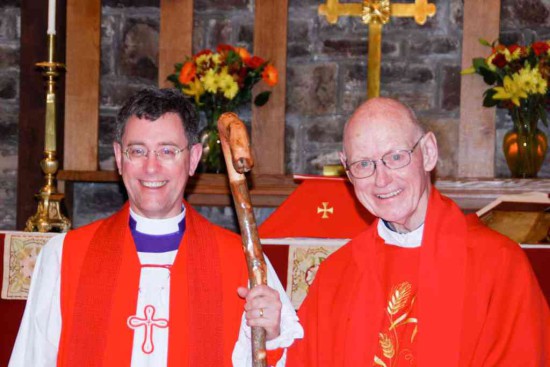MINDEMOYA—The congregations of St. Francis of Assisi, St. Paul’s and St. John’s Anglican Churches gathered recently to mark 50 years of ministry by their spiritual leader, the Reverend Canon J. Bain Peever, who is preparing for retirement after reaching this milestone.
The Expositor had the opportunity to sit down with Rev. Peever following two weeks of celebrations in the basement hall of the glorious stone church of St. Francis of Assisi Anglican Church in Mindemoya.
Rewind to over 50 years ago: a young Bain Peever was the child of a devoutly Anglican family, growing up in North Bay and attending church at St. John the Divine Anglican Church. “This is where I discovered my vocation to the priesthood,” the priest explained.
[quote align=”center” color=”#999999″]“I was under the mentorship of Canon Large,” he continued. “He was a very exciting personality—thoughtful and encouraging to young people. He was anxious that young people check that God wasn’t calling them.”[/quote]
The priesthood wasn’t the first thing that Rev. Peever had in mind as a vocation, though, as he says, “I was all set to join the RCMP. I pretty nearly had one foot on the train. It was almost a St. Paul’s awakening. No dazzling light or anything, but I came to the awareness that police work was not for me.”
With his newfound calling, the young man headed for Montreal to complete an arts degree at Concordia University. In the early 1960s, to study to become an Anglican priest one had to be sponsored by a bishop so Rev. Peever was taken under the wing of Archbishop Wright of his home diocese of Algoma. While studying for his master’s of theology degree at McGill University, Rev. Peever was given the distinction of being named a deacon in order to be priested upon his graduation in 1963.
As a newly minted Anglican priest, Rev. Peever learned of his first church during an ordination dinner celebration. “Archbishop Wright stood up and announced where the three of us (newly ordained priests) were going. When he said I would be going to Mindemoya I looked around and asked, ‘where the hell’s Mindemoya’?” he chuckled.
In 1963, Rev. Peever packed up his family and moved to Mindemoya to lead the congregations at St. Francis of Assisi in Mindemoya and St. John’s the Evangelist in Kagawong. The young priest spent his first three years of ministry here, which left a lasting impression and lifelong connections and friends. When the dean at St. Luke’s Cathedral in Sault Ste. Marie became ill, Rev. Peever was asked to fill in there.
Those three years taught the young priest the importance of caring for people and that parishioners and their pastoral needs were of the utmost importance and “to never underestimate what your presence can do for people.”
“The people of Mindemoya and Kagawong were very warm,” he added.
“This is the only business where I can go to the door, walk in and know that I’ll be welcomed very warmly,” Rev. Peever shared.
The priest’s love of Manitoulin Island stayed with him when he left, maintaining a cottage on the shores of Lake Mindemoya and returning every summer with his wife and two boys.
After serving in churches throughout Ontario and Newfoundland and Labrador, Rev. Peever finally ended up in London when his wife Dale became ill with Pick’s disease, a form of Alzheimer’s. “In 1998 Dale was in a nursing home in London, but I wasn’t happy with the care she was receiving there,” he explained. His sons urged their father to retire and to take their mother to Manitoulin, a place that had brought them both so much happiness, for her final days. After securing a place at the Manitoulin Centennial Manor in Little Current, the Peevers made the move to the Island. While coming to terms with the fact that his wife would soon leave this world, their son, Allan, was diagnosed with cancer. Rev. Peever’s wife and son died within a short time of one another.
“It was a test of faith—the deepest water I ever had to swim,” Rev. Peever says full of emotion at their memory. “I felt like Job at times, but I saw how God continued to love me. I didn’t hear an oral voice saying, ‘Bain, you will see me and the people who love you,’ but the people ministered to me with a strong sense of caring and I learned from that and I can share what I know about caring and loving from the woundedness when one’s loved one becomes ill and terminal.”
“That’s why it is so important to show caring, not just when people are ill, but when people are wounded by earthquakes, hurricanes,” the priest gave as examples. “God is always calling us to share the wealth that we have, and not in a monetary sense.”
It was at this time that St. Francis of Assisi found itself without a rector and when asked, Rev. Peever put his name forward. He got the job, also eventually becoming the priest for St. Paul’s in Manitowaning and St. John’s in South Baymouth.
The parish St. Francis, St. Paul’s and St. John’s belong to, the Great Spirit Island Parish, isn’t called that for just any reason, the Rev. Peever said. “It’s a symbol of the fact it’s a spiritual place. Off-Islanders love Manitoulin. We have the two cultures, Caucasian and First Nations, which makes it not only interesting, but challenging. There’s anxiety sometimes, but that makes it interesting,” he said thoughtfully.
When asked about the future of his church, Rev. Peever took time to respond. “There’s a larger percentage of gray haired people, but I don’t think it’s because people are less spiritual. People’s lives are so exceedingly busy that acts of worship on Sunday mornings get crowded out with hockey, conferences, family acts. And it’s hard for families. I’m not making excuses for them, but children like to be in sports, drama, and how do you carve out time for church? I think people like to be entertained, and they expect that from the church.”
“Moses was called into the desert with his people and they were tested and I think that this is a time of testing for the church universal, especially in Western civilizations,” Rev. Peever shared. “I think that Christians need to be involved in all aspects of living—politics, sports, family life—they need to connect with every facet of life and take part in it; to have the Christian lifestyle is to be seen as important.”
“There’s a lot of joy in Christianity and at times we do not show the joy and celebration side of it as we should,” he said. “I love celebrations, ask any of my people!”
For two weekends in a row, Rev. Peever had been busy celebrating, first with a party in his honour, which Bishop Stephen Andrews attended, followed by a guest preacher appearance at St. John the Evangelist in London, where he had spent time as the priest, and whose congregation was celebrating the 125th anniversary of its church.
The priest said he has thoroughly enjoyed ministering to youth through those 50 years, seeing how God moves and works through them. It’s also important, he added, to keep the planet strong and healthy for the youth. “We don’t own this planet, we’re only stewards, and we need to protect it and pass it in to the next generation,” he said.
Before moving back to Manitoulin, Rev. Peever had been a force behind the popular summer Camp Manitou located along the north shore of the North Channel.
“I spent 15 years with Camp Manitou,” he smiles. “I had the great opportunity to raise money to create a beautiful sanctuary on the North Shore for people to encounter God in nature. To see a child there, playing with shells, worms and snakes, or when a bird falls out of its nest and they work to put it back safely—they learn so much about nurturing. There’s a lack of continued, strong nurturing in our society.”
As for retirement, Rev. Peever said he’s going to take one year for himself—a time he thinks he’ll need for the grieving process he’s sure he will encounter with leaving the church in the capacity of priest. “I’m going to work hard at not doing anything,” he said. “And then I’ll decide.”
But he’s not going anywhere. Rev. Peever and wife Lynda (an Island girl) are quite content at Peever’s Point of View (“take that any way you want,” he quips) on Lake Mindemoya. “God gave me the opportunity to walk through the garden and each time I’ve been able to pick a beautiful rose,” he said of wives Dale and Lynda. “Both have given me so much love, affection and, at times, hell too.”
“Manitoulin is home,” he continued. “When people ask me why I came back I say I’ve come back to die. I will have my ashes buried here. I hope the epitaph on my tombstone reads, ‘Well done, my good and faithful servant’.”
The Peevers also have grandchildren to love, and they are looking forward to spending more time with their growing family. Rev. Peever is also a Maple Leafs man, donning both a watch and a ring with the Toronto team’s emblem, and he’s planning to cheer them on in earnest, hopefully through the playoffs, next year.
Looking back over the 50 years, besides being introduced to Manitoulin Island, the priest gave three examples of highlights of his ministry, one of which was meeting the queen. Queen Elizabeth visited Cornwall for the Trinity Anglican Church bicentennial and to honour the United Empire Loyalists who moved to Canada from the United States following the American Revolution. Rev. Peever entertained the queen for half an hour during her visit. “It’s one of those moments in my life I appreciate,” he said.
When asked what one chats about with the queen, he responded, “church life, the city of Cornwall. She wanted to know why the church was adorned with cornstalks and pumpkins and I explained to her that it was a time of thanksgiving.”
“It was a good day,” he recalled. “One of the highlights of my life. I’m not a royalist, but I like the royals.”
The second example was again ministering to youth, working with Newfoundland and Labrador’s first Premier Joey Smallwood to find young people, who, at the time in the 1960s and 1970s, were hitchhiking across the country in search of work. When the ‘Newfie Bullet’ (the railway) was being disassembled, Rev. Peever got permission from the premier to take control of some of the cars which were turned into temporary shelters for the young people. A much safer option for everyone involved, as churches were often used as overnight shelters and fires were not abnormal from wayward cigarette butts, Rev. Peever explained.
Lastly, the priest shared that he is proud of the successful soup kitchen program he instigated in the city of London, which sees churches and organizations taking turns feeding the city’s homeless and less fortunate each night of the week—a program that is still going strong today, feeding on average 300 people on a Saturday night.
As for a Manitoulin memory, Rev. Peever smiles at the recollection of his first year on Manitoulin and a fundraising car wash venture that saw Mindemoya dried up of all water, including the hospital’s supply. Mike Smith, the owner of the garage where Keller’s is located today, was so pleased with its success, he said, that he gave them $5. “That was big bucks in 1963,” he said.
“I’m amazed at how Mindemoya has grown,” Rev. Peever concluded. “There’s a current of growth here, at the centre of the Island, that’s encouraging. Little did I think all those years ago that this little village would grow into a town.”
Rev. Pever’s last service from the pulpit will be Sunday, September 8.





